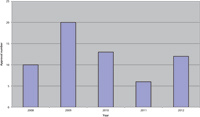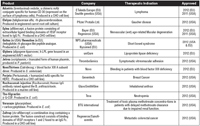
Products approved included three enzymes, three antibodies, and two fusion proteins, as well as a gene therapy product, a regulatory peptide, a blood product, and a colony stimulating factor. Three products are indicated against cancer and a further two against genetic diseases, while the remainder target a wide range of medical conditions.
In terms of expression systems used, 5 of the 11 protein-based products approved are produced using mammalian (mainly CHO) cell lines, three are expressed in E. coli, two in yeast-based systems (one each in S. cerevisiae and P. pastoris), and one product is produced in an engineered plant-based system. These figures once again reflect the ongoing dominance of mammalian-based expression systems in terms of biopharmaceutical manufacture.
 Digging a little deeper reveals that the majority of approvals (10 of the 12) were first-time approvals in 2012. Two of the products (Adcetris and Eylea), although newly approved in one region last year, had gained approval in 2011 in the other region (Table I). Elelyso, moreover, is not the first glucocerebrosidase approved, nor is Tbo-filgrastim the first G-CSF-based product to come on the market.
Digging a little deeper reveals that the majority of approvals (10 of the 12) were first-time approvals in 2012. Two of the products (Adcetris and Eylea), although newly approved in one region last year, had gained approval in 2011 in the other region (Table I). Elelyso, moreover, is not the first glucocerebrosidase approved, nor is Tbo-filgrastim the first G-CSF-based product to come on the market.
Several of the newly approved products are particularly noteworthy in terms of technological or medical innovation, and it is those products that are discussed in most detail below. As Adcetris and Eylea were included in last year's review (1), they are not considered further herein.
A GENE THERAPY-BASED PRODUCT APPROVED AT LAST
The first gene therapy trials date from the late 1980s. In the intervening years, more than 1800 such trials have been approved/initiated world wide. Until 2012, no gene therapy-based product had gained approval for human use in the western world, although a small number of such products have been approved in China (5) and four gene therapy-based drugs/vaccines have been approved for veterinary use in the West (6).
A significant milestone for gene therapy was achieved on Oct. 25, 2012, with the approval of Glybera (alipogene tiparvovec) by the European Commission for use in the treatment of lipoprotein lipase deficiency within the EU. Lipoprotein lipase (LPL) deficiency is a rare genetic condition, affecting 1 in 500,000 individuals and, therefore, the approved product has orphan status. The condition is characterized by absence/near absence of lipoprotein lipase, an enzyme central to dietary-derived lipid metabolism and distribution in the body. The enzyme is expressed primarily by muscle cells and adipocytes and is central to the processing of circulating triglyceride-rich lipoproteins.
Glybera is a replication-deficient adeno-associated viral vector housing a human lipoprotein lipase gene. The product is administered intramuscularly, and the resultant transduction of the surrounding muscle cells results in functional LPL expression, leading to an anticipated positive therapeutic outcome. The vector genome persists in the nucleus of transduced cells as episomes, leading to long-term expression of the transgene. It is anticipated that treatment will be a once-off series of intramuscular injections into the legs. Treatment will certainly not be inexpensive, with as estimated cost in the region of $1.6 million (€1.2 million) per patient.
Despite its eventual approval, European Medicines Agency (EMA) evaluators had some reservations about the product. The Committee for medicinal products for human use (CHMP) considered the Glybera application—and adopted a negative opinion—on two previous occasions in 2011 (7). The committee appeared initially to have a number of product quality-related and efficacy-related concerns, and final product approval is restricted to a subset of LPL-deficient patients suffering the most serious condition-related effect, that of severe or multiple pancreatitis attacks.